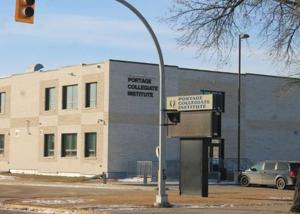Health
Manitoba Public Health Takes Cautious Approach to Measles Outbreak

Public health officials in Manitoba have adopted a subdued messaging strategy regarding a recent outbreak of measles, a highly contagious disease that can lead to severe health complications. Since February 2023, the province has reported 211 confirmed cases and 17 probable cases of measles, prompting health authorities to take action.
Health officials issue weekly bulletins detailing locations where individuals with measles have been present, including schools, medical clinics, and restaurants. These updates are disseminated through local media channels. Additionally, the province uses its social media platforms to share information about the vaccine available for measles, aiming to raise awareness without overwhelming the public with aggressive campaigns.
A provincial spokesperson indicated that the messaging strategy focuses on “targeted communications” rather than broad, widespread campaigns. This includes initiatives like pop-up vaccination clinics and direct communication with schools and parents, ensuring that the information reaches communities effectively.
The current approach contrasts sharply with the vigorous public health campaigns seen during the COVID-19 pandemic, which included daily bulletins and extensive advertising urging the public to adhere to health guidelines. Christopher Schneider, a sociology professor at Brandon University, suggests that the more tempered messaging surrounding measles may stem from public fatigue following the intense COVID-19 response, as well as a significant proportion of the population being considered immune due to prior vaccinations or infections.
Dr. Brent Roussin, Manitoba’s chief provincial public health officer, acknowledged that while the response to the measles outbreak may not be as visible as the COVID-19 efforts, substantial work is ongoing behind the scenes. He noted that the province was able to anticipate the outbreak early, given the rise in cases across other regions, particularly in areas with lower vaccination rates.
“The duty of care and responsibility on the government is to spotlight measles outbreaks since this is a highly communicable disease,” Roussin remarked. He emphasized that the strategy for dealing with measles is not a one-size-fits-all approach, as it differs fundamentally from managing a novel virus like COVID-19, to which the entire population was initially susceptible.
Instead of expansive billboard campaigns, health officials have directed information to healthcare providers, who can engage with patients directly. Communications have been crafted in multiple languages, including English, French, and Low German, to cater to the diverse population in the region. Social media messages are concise and targeted, exemplified by a recent tweet featuring a cartoon image of a baby with a measles rash and hashtags such as #GetImmunized and #VaccinesWork.
Health Minister Uzoma Asagwara stated that the province is adapting its messaging to align with contemporary communication preferences, particularly on social media. This involves pop-up clinics where individuals can ask questions and consult with health professionals directly, facilitating a more personal approach to vaccination.
Despite vaccination being the most effective measure against measles, health officials are also advising on best practices for those who may refuse the vaccine, including early recognition of symptoms and prompt medical attention. Dr. Roussin warned that as vaccination rates decline, the risks of preventable diseases such as mumps and chickenpox increase, underscoring the necessity for ongoing public health initiatives.
The majority of documented exposure sites for the current outbreak are situated in southern Manitoba, an area that has struggled with low vaccination rates during the pandemic. A freedom of information request revealed concerning practices, including instances where unvaccinated children exposed to measles continued attending school. Two-thirds of the measles-related hospitalizations in the province have occurred in the Southern Health catchment area, raising alarms about the potential for severe health outcomes.
Dr. Davinder Singh, a medical health officer in the region, expressed concern over the implications of these statistics. “These are severe outcomes,” he stated, highlighting the importance of vaccination to prevent serious illness. The health minister reiterated the need for tailored public health responses, emphasizing that community-level engagement is crucial in combating vaccine hesitancy.
Local businesses, such as Goodon Industries Ltd., have recognized the importance of public health communication. Robert Dyck, a partner at the company, appreciated the province’s efforts to provide localized responses to exposure incidents. He noted that a public health nurse reached out to discuss potential on-site vaccination clinics, fostering a sense of community involvement.
As Manitoba navigates this measles outbreak, health officials continue to stress the importance of vaccination and community awareness. While the response may lack the visibility of previous health campaigns, the commitment to protecting public health remains strong.
-

 Politics4 weeks ago
Politics4 weeks agoSecwepemc First Nation Seeks Aboriginal Title Over Kamloops Area
-

 World5 months ago
World5 months agoScientists Unearth Ancient Antarctic Ice to Unlock Climate Secrets
-

 Entertainment5 months ago
Entertainment5 months agoTrump and McCormick to Announce $70 Billion Energy Investments
-

 Science5 months ago
Science5 months agoFour Astronauts Return to Earth After International Space Station Mission
-

 Lifestyle5 months ago
Lifestyle5 months agoTransLink Launches Food Truck Program to Boost Revenue in Vancouver
-

 Technology3 months ago
Technology3 months agoApple Notes Enhances Functionality with Markdown Support in macOS 26
-

 Lifestyle3 months ago
Lifestyle3 months agoManitoba’s Burger Champion Shines Again Amid Dining Innovations
-

 Top Stories2 months ago
Top Stories2 months agoUrgent Update: Fatal Crash on Highway 99 Claims Life of Pitt Meadows Man
-

 Politics4 months ago
Politics4 months agoUkrainian Tennis Star Elina Svitolina Faces Death Threats Online
-

 Sports5 months ago
Sports5 months agoSearch Underway for Missing Hunter Amid Hokkaido Bear Emergency
-

 Politics5 months ago
Politics5 months agoCarney Engages First Nations Leaders at Development Law Summit
-

 Technology5 months ago
Technology5 months agoFrosthaven Launches Early Access on July 31, 2025



















